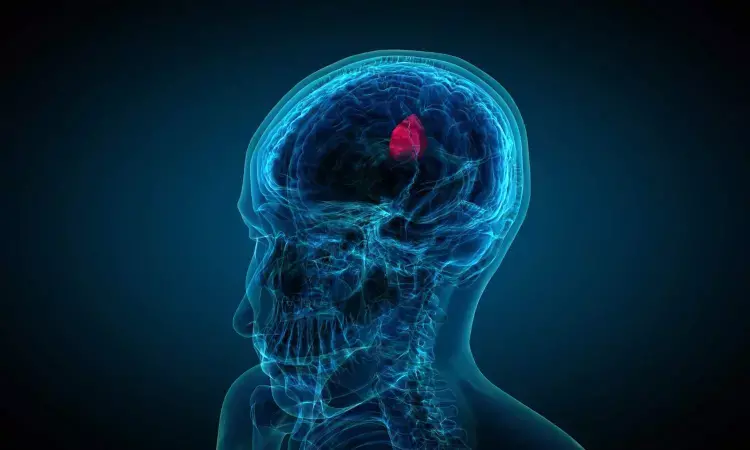- Home
- Medical news & Guidelines
- Anesthesiology
- Cardiology and CTVS
- Critical Care
- Dentistry
- Dermatology
- Diabetes and Endocrinology
- ENT
- Gastroenterology
- Medicine
- Nephrology
- Neurology
- Obstretics-Gynaecology
- Oncology
- Ophthalmology
- Orthopaedics
- Pediatrics-Neonatology
- Psychiatry
- Pulmonology
- Radiology
- Surgery
- Urology
- Laboratory Medicine
- Diet
- Nursing
- Paramedical
- Physiotherapy
- Health news
- Fact Check
- Bone Health Fact Check
- Brain Health Fact Check
- Cancer Related Fact Check
- Child Care Fact Check
- Dental and oral health fact check
- Diabetes and metabolic health fact check
- Diet and Nutrition Fact Check
- Eye and ENT Care Fact Check
- Fitness fact check
- Gut health fact check
- Heart health fact check
- Kidney health fact check
- Medical education fact check
- Men's health fact check
- Respiratory fact check
- Skin and hair care fact check
- Vaccine and Immunization fact check
- Women's health fact check
- AYUSH
- State News
- Andaman and Nicobar Islands
- Andhra Pradesh
- Arunachal Pradesh
- Assam
- Bihar
- Chandigarh
- Chattisgarh
- Dadra and Nagar Haveli
- Daman and Diu
- Delhi
- Goa
- Gujarat
- Haryana
- Himachal Pradesh
- Jammu & Kashmir
- Jharkhand
- Karnataka
- Kerala
- Ladakh
- Lakshadweep
- Madhya Pradesh
- Maharashtra
- Manipur
- Meghalaya
- Mizoram
- Nagaland
- Odisha
- Puducherry
- Punjab
- Rajasthan
- Sikkim
- Tamil Nadu
- Telangana
- Tripura
- Uttar Pradesh
- Uttrakhand
- West Bengal
- Medical Education
- Industry
Late-line treatment with Bevacizumab alone or in combination with Chemotherapy beneficial in Recurrent High-Grade Glioma

Bevacizumab alone or in combination with chemotherapy could be beneficial as a late-line therapy in a subset of patients with recurrent high-grade glioma. A recent study published in Acta Neurochirurgica showed that small 2D tumour size in post-contrast T1 weighted MRI at bevacizumab initiation was independently associated with prolonged time to progression.
High-grade gliomas are the most common primary malignant tumors of the central nervous system. They are characterized by a heterogeneous infiltrating nature that makes their management challenging with poor treatment outcomes. Standard treatment has been established for patients with newly diagnosed glioblastomas. Besides concurrent chemo-radiotherapy and adjuvant chemotherapy with temozolomide (TMZ), the addition of tumour-treating fields to maintenance chemotherapy with temozolomide has shown a moderate improvement in survival compared to temozolomide alone, and the lomustine-temozolomide combination confers a survival advantage in patients with tumors exhibiting O6-methylguanine–DNA methyltransferase (MGMT) promoter methylation.
Bevacizumab is a humanized monoclonal antibody that targets tumor neo-angiogenesis through circulating anti-VEGF action. This treatment has been widely used for various oncological pathologies, including high-grade gliomas. Two randomized clinical trials have evaluated bevacizumab in newly diagnosed glioblastomas in addition to standard therapy. Despite an improvement in progression-free survival (PFS), these trials failed to demonstrate any significant improvement in overall survival (OS).
Yahia-Cherie et al conducted a retrospective study, where they found a response rate of 45.2% and a PFS at 6 months of 34.3% among the 31 patients treated with bevacizumab as a late-line treatment for recurrent high-grade gliomas. An 18-studies’ meta-analysis evaluated bevacizumab in recurrent glioblastomas and found a response rate of 19 to 85% and a 6-month PFS of 17 to 65%.
In their study, they analyzed patients who had a sustained response to bevacizumab (PFS ≥ 6 months). A high proportion of long-term responders had methylated MGMT tumors, exhibited 11C-MET-PET response, and were more likely to have a smaller 2D tumor size at treatment initiation. A multicenter retrospective study evaluated predicting factors of long-term bevacizumab response in recurrent glioblastomas, and 8% of patients had a PFS ≥ 12 months and were considered long responders. Among the factors evaluated, steroids at bevacizumab initiation, the delay between the last chemotherapy and the initiation of bevacizumab, and radiotherapy at recurrence were associated with OS from the start of bevacizumab in a univariate analysis. No prognostic factor of OS was found in the multivariate analysis. The IDH and MGMT status was unknown in 74% and 83% of cases, respectively, and their predictive effect was not analyzed.
The authors concluded that bevacizumab alone or in combination with chemotherapy could be beneficial as a late-line therapy in a subset of patients with recurrent high-grade glioma. The median time-to-progression was higher in patients with methylated MGMT promoter tumors. Further analyses of larger cohorts of patients are needed to identify clinical, radiological, and molecular prognostic factors of bevacizumab response.
Reference
Yahia-Cherif, M., Luce, S., De Witte, O. et al. Late-line treatment with bevacizumab alone or in combination with chemotherapy in recurrent high-grade gliomas. Acta Neurochir 165, 693–699 (2023). https://doi.org/10.1007/s00701-023-05524-7
MBBS, DrNB Neurosurgery
Krishna Shah, MBBS, DrNB Neurosurgery. She did her MBBS from GMC, Jamnagar, and there after did direct 6 Year DrNB Neurosurgery from Sir Ganga Ram Hospital, Delhi. Her interests lie in Brain and Spine surgery, Neurological disorders, minimally invasive surgeries, Endoscopic brain and spine procedures, as well as research.
Dr Kamal Kant Kohli-MBBS, DTCD- a chest specialist with more than 30 years of practice and a flair for writing clinical articles, Dr Kamal Kant Kohli joined Medical Dialogues as a Chief Editor of Medical News. Besides writing articles, as an editor, he proofreads and verifies all the medical content published on Medical Dialogues including those coming from journals, studies,medical conferences,guidelines etc. Email: drkohli@medicaldialogues.in. Contact no. 011-43720751


